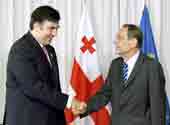We’ve done our bit, you do yours
By Temuri Kiguradze
Wednesday, October 1

Solana arrived in Georgia on September 30, presenting a team of EU military observers who are going to monitor the situation in the conflict zones of Georgia and replace Russian troops in so-called “buffer zones” outside the conflict areas. The 200 plus observers will be stationed at Tbilisi, Poti, Zugdidi and Gori. Each of these cities will host a team of about 70 observers. Their presence fulfils part of an agreement reached between the French and Russian Presidents in Moscow on September 8.
“I am optimistic that all parties will comply with the agreement which was signed,” Solana told reporters. ''We have fulfilled our obligation and are going to organize a conference in the near future to declare our support for Georgia. Having fulfilled the obligations we took upon ourselves on September 8, we are now calling upon the other parties involved in those negotiations to fulfill their obligations as well,'' he stated. After the presentation Solana visited the refugee camp in Gori.
Georgian Interior Minister Vano Merabishvili has said that first of all Russian forces should leave the so-called “buffer zones.” Afterwards, “we are sure that with the help of the [EU] monitors, we will be able to take control of those territories currently controlled by the Russians.” “Our opinions absolutely coincide with those of the monitors,” Merabishvili told local reporters on September 30. “The visit of Javier Solana is another response by the EU to Russian aggression” said Georgian Parliament Chairman David Bakradze to local journalists. He added that EU observers coming to Georgia is just a first step, “the final goal is the deployment of observers in the conflict zones themselves.”
Meanwhile in Strasbourg, the Parliamentary Assembly of the Council of Europe (PACE) has discussed reports about Georgia. Georgian and Russian MPs have also reported the position of their Governments on the August events. The Russian Government has several times stated that it will not allow European monitors into the Georgian breakaway regions of South Ossetia and Abkhazia, which it recognized as independent states on August 26. In September Russia and the separatist leaders signed an agreement under which Russia has taken on an obligation to provide wide-ranging support for these regions, including the deployment of Russian military bases in each of them. Georgia has declared Abkhazia and South Ossetia to be occupied by the Russian Federation. The territorial integrity of Georgia is supported by the international community, including the EU and UN.
Speaking at the Assembly Secretary General of the Council of Europe Terry Davis said he had disapproved of the work of Russian peacekeepers from the very beginning, as they had failed to protect the local Georgian population. He said resolution of the conflict was “very important” because both Russia and Georgia were EU partner countries. Matyas Eorsi, a member of the PACE commission which visited Georgia a week ago, said that simple visits to Moscow or Tbilisi were “not sufficient” and that an international investigation was necessary to look into the problem more profoundly. He said it no longer mattered who began the war, the key task now was to prevent such aggression in the future.
Georgian independent political analyst Ramaz Sakvarelidze says that Russia “will never agree” to let international observers enter the territory of Abkhazia and South Ossetia precisely because Europe is applying pressure. “Russia is a country which tries to show that it can resist any kind of pressure and act independently,” he says. Sakvarelidze believes the only way to make Russia allow international forces to monitor the conflict zones is for the international community to “proves [to Russia] that this can be somehow beneficial for itself.”
